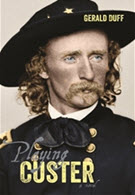| News |
| Monday, 07 September 2015 18:02 |
|
Playing Custer Reviewed on Texas Book Lover
The West does not need to explore its myths much further; it has already relied on them too long. - WALLACE STEGNER (page vi) Playing Custer is the newest historical fiction title from award-winning author and native Texan, Gerald Duff. Employing multiple narratives from 1876 and 2001, Duff brings us the voices of the United State 7th Cavalry and the Sioux and Cheyenne, from what is popularly known as Custer's Last Stand, and the contemporary voices of the historical reenactors who converge on the Greasy Grass, also known as The Little Bighorn, each June. Duff builds a complex picture of many kinds of transformation, one puzzle piece at a time. If you're an Indian dealing with the man, don't try to get intellectual, now, or truculent, and whatever you do, don't launch into a logical argument about some point of disagreement. White folks don't want to hear that kind of garbage from an Indian. But say something that smacks of the mystical or uses the concept of the heart as representative of a knowledge not subject to intellectual inquiry, and baby, you're no longer an Indian whining about rights and dispossession, you're a Native American in touch with the immeasurable. Duff moves smoothly between speech patterns, rhythms, and vocabulary of the present and the past, of divergent ethnicities and origins, and social stations. From 1876: "I hope that bunch of Indians will try to fight like white troops, and not just swarm like a bunch of yellow jackets when you stir up their nest." From 2001: "Well, it's a dramatic reenactment, Eagle Beak," I said. "It's not the thing itself. What matters is the idea of the thing, not the thing itself." Duff is also adept at stirring description. This passage gave me chills – Crazy Horse makes his move and shoots the gap in the 7th Cavalry's defensive line: It was then, as I leaned my own body to the right in sympathy with the line of troopers, hoping to witness the joining of the end of that body of my men with the left end of the company to our right, that the event transpired which cut off the success of our maneuver. A single horseman, a savage dressed only in a species of animal skin about his loins, bearing a great number of spots of white paint all over his body, along with a great smear of red and yellow coloring his face itself, suddenly burst into view just at the flank of the company which my men had been straining ranks toward. He leaned over, this apparition with long light-colored hair streaming unconstrained down his back, and began swinging a long-handled club at the head of the trooper just at the end of the company which my men were struggling to reach. There are almost as many motivations in this battle as there are participants: patriotism, religion, duty, orders, revenge, blood lust. The reader's task is the same as that of the reenactors: not to view these characters with modern eyes. Duff points out our (continuing) insistence on viewing people seemingly unlike ourselves as Other. "Mirabeau," I said, being jocular, "you are looking so good, my fine young warrior. Give me a high five." At that, he turned and gave me a look that had about it more authenticity than any other bit of acting business I had ever seen on the banks of the Little Bighorn up until then and since that day. It said, that look of intense concentration did, not "I'm about to kill you, white man," or "Just keep standing there until I get my stone club unlimbered," but instead it asked a simple question: are you a human being? Are you and I of the same species of mammal, or am I being talked to by a porcupine suffering from brain damage? The plot of Playing Custer is original and well-executed. The pace is even though I was sometimes eager to get through the character's backstories and return to the narrative. I'd been curious as to how Duff was going to wrap this up. The ending is satisfying as well as surprising. The research required is evident in the meticulous detail. Duff has evidently set himself the goal of the reenactors: "stringent authenticity." I've come to understand that all historical fiction is speculative fiction. Duff has provided us fine speculation. As the author points out on the dedication page, history is fiction. And written by the winners.
To read the complete review on Texas Book Lover, click here. |

